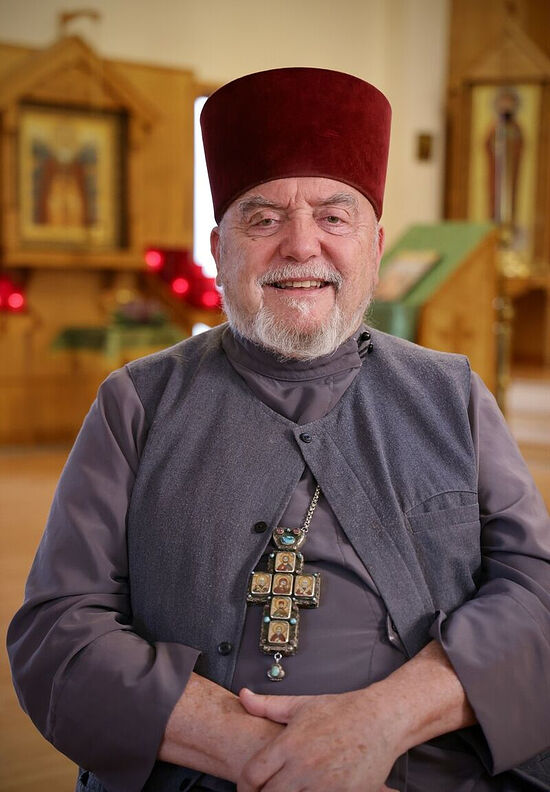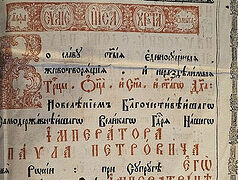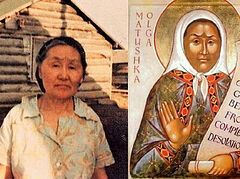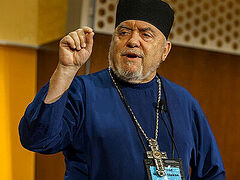Atrakun Aatam, cali Qetunraam, cali Tanqiliriim Anernerem. Amin. Saint Paul once wrote to the Thessalonians, “You are our glory and our joy,”1 words that so aptly describe the newly-departed Archpriest Michael in his apostolic service to the first peoples of this land, for those peoples were and will ever be his glory and his joy. He approached the first peoples as Ruth did Naomi: “Thy people shall be my people, and thy God my God.”2 And he became one with the people, one of the people, an elder among the people, a yuk, a real human being. He did this by rejoicing with them that rejoice and weeping with them that weep, but especially rejoicing with that joy3 of Christ’s resurrection that so animated Father Michael in everything he said and in everything he did. Unguillra Kristusam tangerrluku.
Father Michael was many things to many people. For some, he was a loving father in the village and parish; for others he was an exceptional speaker or engaging teacher; for others still, he was a vocal advocate for Alaska’s clergy and peoples. In every situation, Father Michael’s voice could draw in a listener from any background and open that person’s heart to hear a word about the Russian Orthodox faith, or about Alaska and her peoples. Walking faithfully in the footsteps of the missionaries and saints who came before him, Father Michael lived his entire life for the Orthodox faith and for those whom he served.
In giving his life for the service of others, Father Michael did so with an enthusiasm and vitality reminiscent of the missionary labors of our own Saint Innokenty and Saint Yakov. He would serve in a village for a weekend, fly out for an event or talk and then return to that village to resume his priestly duties—all done seamlessly, effortlessly, and joyfully. This is because Father Michael took to heart the words of the Holy Apostle Paul, “I am made all things to all men, that I might by all means save some.”4 But not only did he have such vitality in continuing the tireless labors of the saints, but perhaps more importantly he approached the people as did Saint Herman and Saint Innokenty with a humble spirit and a desire to learn from them: their culture, their wisdom, their way of life and then he made them completely his own.
His life was the story of falling in love with a people and humbly becoming one of them. Like a little child, he learned from them, before presuming to teach as an elder. And then with great love for them, he taught what he had learned to the entire world. His heart embraced their struggles, their trials, and their often all too traumatic history. And then he wisely used this knowledge in his heart to confront the issues, which they and we face today as a Church and as a people. Most of these issues afflicting the Alaskan peoples are not unfamiliar to us; but in an age where secular solutions are offered for spiritual problems, Father Michael always understood that Christ is “the Way, the Truth, and the Life”5 in Whom every problem can be solved, in Whom every trial can be overcome, and in Whom every tear can be wiped from the eyes of the sorrowing by the hand of God.6
The Holy Apostles were known for speaking “the word of God with boldness.”7 And Father Michael, he followed their example. During the most difficult times in the Diocese, Father Michael was not afraid to speak up for those who could not speak and to fight for those who were unable to fight for themselves. As a skilled historian, Father Michael never forgot that it was once the Russian Orthodox Church who stood strong for the people against all attacks and harm. Just as Apa Herman defended the Supiak people of Kodiak against the exploitation of the Russian American Company, so Father Michael would stand up for the people of Bristol Bay and advocate for their land and their traditional way of life. Just as Saint Yakov would easily journey between the diverse nations and peoples of Alaska, so would Father Michael journey, be accepted, and be loved wherever he would go. This was most evident when the Alaska Federation of Natives adopted him as an elder, something which demonstrates without any doubt his authenticity as a man of the Alaskan peoples. How could this man from immigrant stock, originally a native of Pennsylvania, come to Alaska and become adopted as an esteemed elder? The humility of our Christ and the love of our Christ. That is the way that led not only to such acceptance on earth, but also his acceptance by the Saints themselves in heaven.
In following this path, Father Michael did not hide the teachings of the Alaskan elders and the lives of native peoples under a bushel basket, but rather he put it on a candlestand so that their light could be seen throughout the entire world.8 Thus, he shared with the wider world and even further enlightened that wider world with the story of the first peoples as they understand themselves. He told of their honorable way of life, their deep philosophy of being a real person, their struggles and their joys. This he did, not from the perspective of an academic who interviewed elders and simply relayed their stories, but rather as a disciple and a friend, reporting that “which he has heard, that which he has seen with his eyes, that which he has looked upon, and his hands have handled.”9
When we choose to think of the man, this great man that lies before us, let us cherish the precious legacy that he is passing onto us, the people of God, a legacy of selfless love for every single person, no matter their condition spiritually or physically, a legacy of fighting every single day for our faith, our way of life and the values and teaching of the elders who understood how to please the Creator, Christ our God.
My dear, dear father, your earthly presence, your wisdom, your love, your smile, your good cheer will be sorely missed. You have earned your rest as a good and faithful servant. Know that you are honored by your family, your Matushka Xenia and your children who stood with you every day, fighting the good fight. Look around at the Church gathered and know that your life will be remembered for the good work you did among the people and for the people. Father, your work will not end here; Father, your impact will not end on this day. As bishop of this Alaskan flock, I will not allow the torch you carried in your life to be extinguished, nor will I permit any harm to the people you loved and the people I love by those who do not try to understand them. Father, you were a partner in my labors. Father, you were a teacher in Christ instructing me in the same way as you were taught by those before. From you, dear father, I learned the true history of what would become my people. From you, dear father, I learned the importance of holding onto the traditions of the elders and the culture of our peoples. From you, dear father, I have learned the importance of honoring what the people treasure as part of their identity that distinguishes them from the rest of contemporary culture: their native languages, their native customs, and their Church Slavonic. I will not forget your teachings, but I will honor them by making them my own. That is my promise, dear Father Michael.
Thank you, wise and humble teacher. Well done, good and faithful servant. Enter now into the joy of your Lord. Through the prayers of the Saints, you loved so much, Saint Herman, Saint Peter the Aleut, Saint Juvenaly and his companion, Saint Innokenty, Saint Yakov, and the soon to be glorified Saint whom you in your writings made known to the world, the Blessed Matushka Olga, through their prayers, may you, dear, dear Father Michael, now find rest from your labors with all the saints in the never-setting day of the Kingdom of heaven. Yuucimun Iquilngurmun. Вечная Память. Memory Eternal. Amen.





